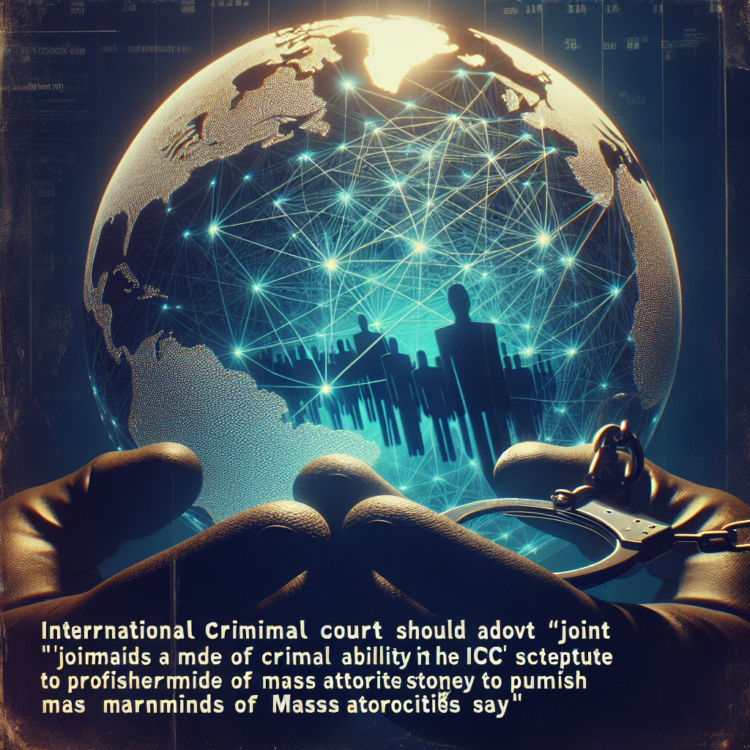The International Criminal Court must reform to better bring the masterminds of mass atrocities to justice, experts have said.
The International Criminal Court must reform to better bring the masterminds of mass atrocities to justice, experts have said.
International tribunals and national courts have been able to use joint criminal enterprise (JCE) to hold those responsible for the planning and organisation of hideous crimes to justice, but it is not used by the International Criminal Court.
A new study warns that if this trend continues, there is a risk joint criminal enterprise – crucial for helping nations get retributive, restorative, and social justice – will fall into disuse for international crimes prosecuted before the ICC.
The research says ensuring the ICC uses JCE will help victims get accountability and act as a deterrent to stop future mass atrocities.
Mass atrocity crimes are made possible by criminal networks of masterminds. The proposed change could help the ICC find the involved high ranking military officers and politicians guilty of collective criminal responsibility.
Experts say this is particularly important for those nations which don’t have stable legal systems.
The study, by Kevin Aquilina from the University of Malta, and Klejda Mulaj, from the University of Exeter, proposes that the ICC’s Rome Statute should be amended so joint criminal enterprise is incorporated into Article 25(3)(a) to include criminal acts through another person via JCE, and adding provisions to define its elements to guide the Court’s interpretation. This will enable the ICC to apply JCE like the international ad hoc tribunals for the Former Yugoslavia and Rwanda have done in the past.
Dr Mulaj said: “Victims of mass atrocities need restorative justice – as well as crimes being punished through criminal processes – so that they can get recognition and start to move on from their ordeal. This can only happen if those responsible – both directly and indirectly – who have been involved in planning, organisation and enablement of mass atrocities, are punished.
“Joint criminal enterprise is a useful weapon for prosecutors as it helps them establish facts and events, and it is important, also, for victims. Now we need ICC member states to support its use.
“Societies cannot heal if the truth of their ordeal is not ascertained, impunity is not challenged, and a modicum of accountability is not achieved. Criminal justice has the potential to offer an important service to this end.”
Researchers hope their proposals will be considered by an ICC Review Conference to be convened by the Assembly of States Parties to the ICC Statute.
Dr Mulaj said: “The current situation means that JCE is in peril. There is a danger that, while it has been, and continues to be, a success story in national law and before international ad hoc tribunals, once the latter are definitively wound up, JCE may meet its untimely death in international criminal law.
“The ICC has made a deliberate decision not to apply it and, instead, rejected it and substituted it by indirect perpetration based on joint control of the crime, thereby risking the end of JCE within the realm of ICL.”
The ICC has adopted a different mode of group criminal responsibility – that of indirect perpetration based on joint control over the crime.
Prof Aquilina said: “JCE should not fall into disuse and that it should not remain the product of case law which is not universally accepted as binding on all international criminal courts and tribunals, and customary international law which, at times, is unclear as to the exact rules that regulate this mode of criminal responsibility once it is unwritten in treaty law and thus difficult to discern the attendant uncertainties and lack of detail. If criminal responsibility continues to be undefined in ICL, it will remain within the subjective interpretation of individual courts and tribunals.”
The change would hold to account all co-perpetrators involved in the planning of that group crime, because they are all responsible for each other’s behaviour within that group.
An accused co-perpetrator must have participated in the joint criminal enterprise, played a specific role in that enterprise, and had the intent to participate. Prosecutors would have to prove that there was in existence amongst all co-perpetrators a common design.
The study proposes how JCE can be further improved to be used in the international society’s arsenal to convict mass atrocity perpetrators where indirect perpetration based on joint control over the crime fails.
Journal
Contemporary Justice Review
Method of Research
Observational study
Subject of Research
People
Article Title
The International Criminal Court and responsibility for mass atrocities: Can JCE enhance capacity to hold masterminds accountable?
Article Publication Date
13-Jun-2024




